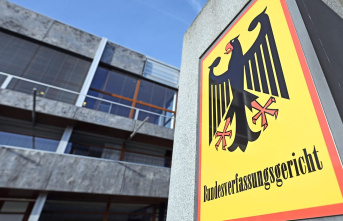the rating Agency Standard & Poor's Christian Esters in constant contact with ministries. He studied the latest economic Reports and news, because his Team analyzed according to strict criteria, such as a credit worthy individual countries.
The time of the spotlight is something: Greece, Italy, and Spain during the Euro crisis, the credit controller drives the problem children of Europe, and decided with your reviews, whether and to what terms, individual countries were able to borrow money.
currently, ester is watching the developments very carefully: Because all around the globe is padded and not spilled. The States, brace themselves against the consequences of the Coronaviruss and the costs. At least 15 trillion dollars - that's 15,000 billion have governments and Central made banks for the suppression of Corona-pandemic and the consequences of loose. The world-mountain of debt will always grow faster: the debt of companies and banks expects the banking lobby Association of the IIF (Institute of International Finance) is unimaginable 250 trillion dollars. A Nightmare?
Fresh money are almost at zero tariffester of the S&P more likely to be left. This is mainly due to the fact that interest rates are so low. In the analysts hands-this is called a "supportive environment". What is meant is that The burden of debt pressed so heavily on the budget because of debt is currently make hardly costs anything. "This can be observed already in the last few years. Although the debt increased, the interest burden in the household declined," says the Director for countries ratings at S&P. In clear text: For ester of the current global debt Orgy is no reason for alarmism.
The Economist Niklas Potrafke, head of the ifo Institute, the Department of public Finance and political Economy, on the other hand is worried. "I think of the many debt do nothing", says Potrafke in the DW-interview. The government debt could be thought of as a balloon. "And if you inflate the always on, then it bursts just at some point."
in the face of the historic challenges presented by Corona, the rescue and stimulus were justified packages, the pressure from the balloon out but had to as quickly as possible. The borrowing reduce is Potrafkes foreign exchange, because to put only on the low interest rates, the risky bet was "the future."
", Developed markets more resilient"For the head of the Department macroeconomics at the German Institute for economic research (DIW), Alexander Kriwoluzky, are on the other hand is in the air balloon is still in place. "Since the citizens do not have to Worry." Kriwoluzky refers to the fact that the German debt ratio after the financial crisis, at 80 percent, and then almost in the Maastricht Treaty of 60 percent has been reduced.
However, Sticking to the Black Zero (i.e., the goal of a balanced budget in Germany) was not occurring in the last ten years, only silent: In state agencies has saved the state sold property such as apartments to private investors, investment moved. The not have to repeat itself, writes Kriwoluzky: "The debt we build up now, we must not degrade in these drastic times, as they have been reduced in the last few years."
What is happening in Germany, which is taking place internationally in quite other scales. In the USA, China but also in some countries of the Euro-zone debt have been rising for some time (see graphic) and get through the Corona now, once again, a new Dimension. The IIF is forecasting for the current year, the debt in relation to economic performance at a whopping 342 percent increase. "There is a strong tendency that debts have increased in the last ten years", so Kriwoluzky. The show in the long-term Trend over 100 years. Nevertheless, he could see but neither in the US nor in China, "that can't pay their debts."
Also, the credit controller Esters for the industrial countries are currently a low danger due to the Corona of a shock. "The developed markets, we see as more resilient. In the case of the Emerging Markets, we expect a larger influence of the Corona-crisis on the credit," said ester.
Second world war - debt to GDP ratio of 400 percentThe Corona of a pandemic is often as the biggest challenge since the Second world war is described. However, the current Situation and the level of debt from 1945 are hardly to compare, says the economic historian Albrecht Ritschl, who teaches at the London School of Economics. Although the corona crisis Similarities with war economies have, on the subject of debt there were large differences. "Shortly after the end of the war, the debt ratio of Germany was at least 400 percent," says Ritschl. The Numbers vary, some historians estimate nearly 700 percent. "There was, at the time, debt is a hidden state, and we don't know exactly how high the gross domestic is product," says Ritschl, the different values.
Britain, France and Italy had amassed mountains of debt. The layers according to Ritschl – the two - to three-times the gross domestic product. "Unlike in Germany, an attempt has been made there, these debts wegzuinflationieren," says the economic historian. "In Germany, however, went to the Second world war, the way of the haircut." The domestic debt of the state, and in 1953 were removed, the currency reform of 1948, the foreign debt of the Federal Republic of Germany, to a large extent. "This has facilitated the policy of the Bundesbank in many respects."
this growththe debt-options has changed since 1945, nothing: How States can reduce, either through an increase in the money supply - i.e. Inflation - their debts, or by a savings course, your budget balance to improve. The options have been exhausted, remains at the end of the insolvency. So given it is in this year, Argentina and Lebanon - which are usually followed by long and tough negotiations with creditors. A fault most of the section is the last, and for investors rather unbeliebtere Option.
could decrease While the US and China about Inflation, the debt is something that this Option for Germany and Italy, so the macro-economist Kriwoluzky from the DIW. "Here, you have no state Central Bank, which could make the rules." How hard it is to control the Inflation in the Euro area, shows the struggle of the European Central Bank: for years, the ECB tried, unsuccessfully, to reach an Inflation rate of two percent.
one of the Economists are largely agreed that the topic of growth. Because if the economy is growing, the gross domestic product in combination with low interest rates, the debt shrinks as rate.
Niklas Potrafke ifo Institute is not urged, however, to rely only on growth, but in addition to the austerity policy in return. For this it is necessary to have a clear savings rules in the Constitution. "Our studies show that countries that have fiscal rules in the Constitution, which grow faster." However, by Corona, Germany is just the other way. So it was only exposed recently, the constitutional debt brake, to provide the support and stimulus packages. "A swift return to the debt brake, is important," says Potrafke.
Who pays the bill?But who is responsible for the debts of today? Many people of the younger Generation fear that this task remains on you. "Of course it would be better for the younger Generation, if the debt does not need to be built, but we now have the Corona pandemic," says Alexander Kriwoluzky from the DIW. The debt-financed economic stimulus programmes would help the younger Generation, but even." The longer the recession is, the more Jobs will be lost for future generations."
Also Kriwoluzky from the DIW argues, in the long run for the Save. He is but on the other hand, to set clear savings Deadlines. Because in the case of a further shaft of the Coronavirus, the state would not have to take money in the Hand, so that the economy comes to a Standstill. The balloon could be filled with air - whether it bursts, therefore, remains open.
author: Nicolas Martin
*The contribution "Brings the Corona-crisis, the debt-to-Burst balloon?" is published by Deutsche Welle. Contact with the executives here.
Deutsche Welle Date Of Update: 24 June 2020, 05:26










